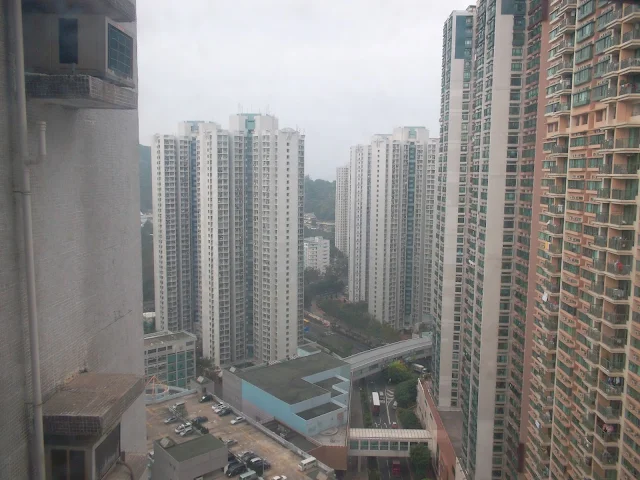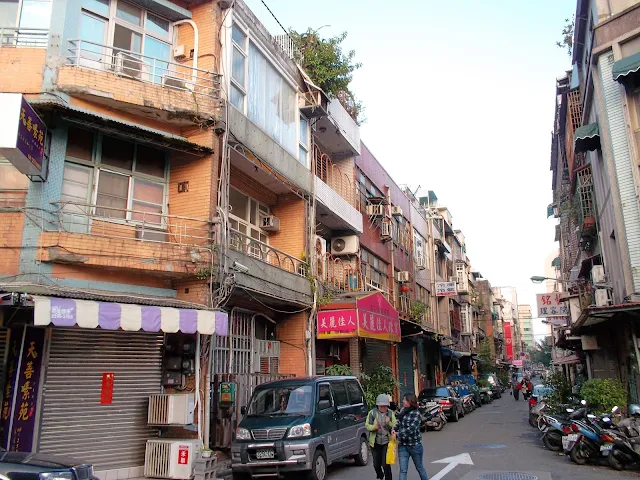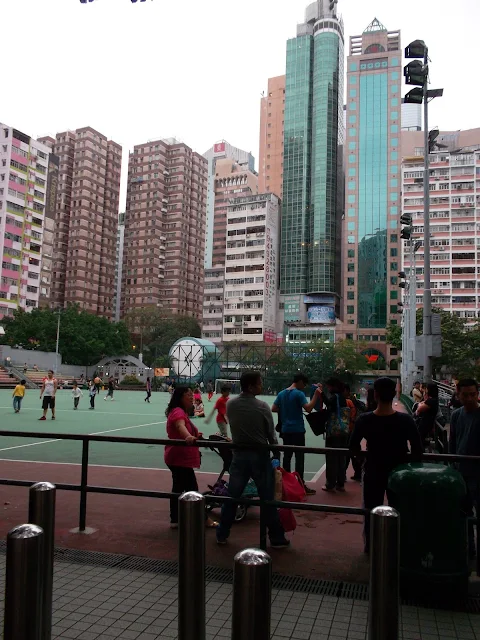I have already spent almost two months in Hong Kong, and the day of my departure draws nearer and nearer. I had already come to Hong Kong twice before, once in April and once in October last year. I had really had a great time back then, meeting nice people and having a lot of things to do every day.
After spending more than a year in Taiwan, I made up my mind to explore the life in another place, and I chose Hong Kong, which is both a wonderful world city and a gateway to mainland China. I will write a post about my experience in Hong Kong some day; now I would like to make a comparison between Hong Kong and Taipei and list off some differences between them.
1) Thousands of Skyscrapers vs Two Skyscrapers
Hong Kong is a skyscraper city. Not only does it have one of the most stunning, beautiful and distinctive skylines in the world; but the majority of the population actually live in the thousands of skyscrapers that can be found on every corner of Hong Kong Island, Kowloon and the New Territories. For example, the residential area in Kowloon where I live is full of buildings that are 30-40 floors high.
 |
| Hong Kong's skyline |
 |
| The "hugeness" of Hong Kong's streets |
 |
| View from the window of my room in Hong Kong |
Taipei does not have an impressive skyline. Most buildings are small, I would say European-sized, and its most famous skyscraper, Taipei 101, stands like a lonely giant in the midst of average buildings, like a tree in a meadow. There are basically only two high-profile skyscrapers in Taipei: Taipei 101 and the Mitsukoshi Department store in front of Taipei Main Station. Of course, there are also other tall buildings, and some of them could even be described as skyscrapers, but they're scattered in different places, far away from each other, almost hidden, as if the city planners had been ashamed of grouping them together.
 |
| A street in Taipei - wow, houses with only three storeys! |
 |
| A solitary skyscraper - Taipei 101 |
2) Huge but Small
As huge as Hong Kong's skyscrapers and residential complexes might be, the flats that these architectural giants were built to contain are surprisingly small. The contrast between the colossal looks of the buildings and the tiny flats inside is almost a joke. Entire families have to live in flats with only two rooms, and some flats are so tiny that Hong Kongers call them "cage homes".
Taipei is the opposite. The buildings are not huge, but the flats have an acceptable size. To be fair, there are also many tiny flats, called 套房 (tào fáng), usually consisting of a single room and a bathroom. However, the problem of small flats cannot be compared with the situation in Hong Kong, where flat "subdivision" and cage homes are a widespread phenomenon.
3) An International City vs A Wannabe International City
As an ex British colony and a major global financial centre, Hong Kong has developed into one of the most international and cosmopolitan cities in Asia. Walking on the streets of Central or Tsim Sha Tsui, one feels the flair, charm and energy of a metropolis. In some areas like the Mid-Levels or Lan Kwai Fong there are so many foreigners (mostly Westerners) that if one could get there directly from the airport one would wonder if the plane was not diverted back to Europe.
Taipei, though economically globalized, is both geographically and psychologically insular. If you happen to be walking near a university campus and you are a foreigner, school kids - who know the best place where to find you - might come to you and ask you questions: "Where are you from?" "Do you love Taiwan?" This is their school assignment, and you have become part of it. I don't know how many times this happened to me. One day I was in a bad mood and I even told them I didn't love Taiwan, so I brutally screwed up their homework.
Everyone wants to learn and practice his or her English. As a foreigner you are 'exotic' and 'cool', but if you fall in love with someone's daughter you may find out her parents are afraid you might be evil and unreliable and possibly a drunkard. There is a love-hate relationship between Taiwanese and foreigners, a mutual attraction that is often not coupled with an equal portion of mutual understanding - perhaps because there are not so many of us.
Everyone wants to learn and practice his or her English. As a foreigner you are 'exotic' and 'cool', but if you fall in love with someone's daughter you may find out her parents are afraid you might be evil and unreliable and possibly a drunkard. There is a love-hate relationship between Taiwanese and foreigners, a mutual attraction that is often not coupled with an equal portion of mutual understanding - perhaps because there are not so many of us.
4) Cantonese vs Mandarin
The official languages in Hong Kong are English and Cantonese, while the official language in Taiwan is Mandarin Chinese, the same as in mainland China. For a foreigner who cannot speak Mandarin, surviving in Hong Kong is easier than in Taipei. But if you speak Mandarin, it might be the opposite. In fact, it is true that many Hong Kongers can speak English (the level depending on their education), but there are also many people that cannot speak either English or Mandarin, but only Cantonese. So, if you speak Mandarin you can communicate with everyone in Taipei (maybe excluding some very old people who speak a dialect), but you might not be able to talk with a certain part of the Hong Kong population. On the other hand, if you're in Taipei and you can only speak English, you'd better learn how to use your hands to communicate effectively.
5) PRC vs ROC
On July 1 1997, the flag of the People's Republic of China (PRC) was hissed for the first time in Hong Kong, and ever since then the former British colony has been a special administrative region (SAR) of the PRC.
The flag of the PRC was never hissed in Taiwan. Taiwan's official name is Republic of China (ROC), the country founded on January 1 1912 in mainland China. The Communists and the Nationalists (Guomindang) both see Taiwan as a province of China. However, Taiwan has its own government and military, and it is still proudly something else than the PRC.
6) Banks vs IT
You may have heard of HSBC and Acer. The first - Hong Kong and Shanghai Bank Corporation - is one of the most renowned Hong Kong brands in the world. The latter is one of the most famous Taiwanese brands and a world market leader in the computer industry. Taiwanese products - HTC, Asus, MSI, ot name only a few - can be found in every store of every country. Hong Kong's economy, after its industrial decline, is rather based on services and finance.
7) Extremely Fast vs Less Extremely Fast
Life in Hong Kong is breathtaking. Not only because the polluted air may clog up your lungs, but also because of the rhythm, the speed and the energy of this city. Day in day out masses of people flood the streets, go to work, go home, go to party, go clubbing - it is a never-ending flux of activity.
If you compare Hong Kong to Taiwan - Taiwan seems slow! To a European they both appear to have crazy lifestyles, with work, money-making, slave-like life-corroding working hours as the absolute priority. Nevertheless, Hong Kongers apparently enjoy going to Taiwan because of the 'relaxing' pace of life.

Some brief sharing from me, as a Malaysian Chinese visitting the two countries some time ago.
ReplyDeleteTaiwan: I had an oppotunity to visit Taiwan in the month of May 2011 for a wedding photo shooting session in 基隆 and subsequently a brief visit to 台北市 before returning back to Sabah, Malaysia. My feeling towards these two places was quite pleasant one. As a visitor, i felt the warm hospitality given by the taiwanese particularly from their constant greetings whenever we visit any shops. Throughout a week of staying there, I can say I have never met a single Taiwanese showing bad attitudes towards us. Everyone seems to be smiling and happy with their life. There's even an occasion when we have used up all our NTD and was nervous not being able to locate money exchange retailer to convert our local currenty to NTD. A lady was really kind enough to offer her assistance without us asking for help and directed us to the Bank of Taiwan for that purpose. She even wished us well and happy visitting in Taiwan.
Hong Kong: For me, the same cannot be said for Hong Kong. In February 2012, I was seconded to Hong Kong for an assignment and I stayed there for 2 months at Harmony Mansion along Hennessy Road on the Hong Kong island. The Hongkongers does not seem to be as friendly as the Taiwanese. Everybody seems to be only minding their own business. I don't like, particulary shopping at the street market whereby the traders there have this attitude as if we are oblighted to purchase thier goods. Do not make a bargain if we are not serious to buy their things, otherwise we're going to get bloody scold from them. Overall experience was not as pleasant as when staying in Taiwan.
Hi, thank you for sharing your experience: )
ReplyDeleteWell, different people have different impressions of the same places, I guess. Personally, I agree that Hong Kongers are less polite than Taiwanese - generally speaking - and also very busy.
In Taiwan people are usually polite; however, in my experience, when you know people deeper, they are not necessarily as polite. In fact, I have also met some very rude people. They weren't rude at the beginning, but after getting closer they changed. This was a real shock to me, because I assumed that their politeness reflected their true feelings and character. But that is not necessarily the case. I don't really like politeness if it's not heartfelt and honest.
Personally, I have met nice and rude people in both places, and one needs to get to know them to understand what kind of personality they have. I think that politeness can sometimes hide the real personality.
Just to give you one positive example about Hong Kong: the neighbours in the place where I live here are very nice. They smile and say 'hi', they also play with my flatmate's cats. But in Taiwan, my neighbours are very cold, and rarely say hi or talk to each other.
But that's just my personal opinion. I've already heard a few times that people didn't quite like Hong Kong. But I myself enjoyed staying both in Taiwan and HK, I think they both have their own good and bad sides.
hmm. if it helps, I'm pretty sure that the dialect that Taiwanese use is known as Hokkien/Min nan. other than that, I'm sorry that I'm unable to contribute much to this. :(.
ReplyDeletehey dude, very interesting blog. it is very interesting for me. as a person who has previously lived in the mainland, my opinion of the bad things of taiwan is quite different to yours. all the things you dislike are worse tenfold on the mainland. taiwan seems quite awesome to me now, compared to living in mainland china.
ReplyDeletei think you should consider living in the mainland for a period of time in the future, to really put taiwan in perspective! the things that bug you will really pale into insignificance when you have dealt with the problems of living as a laowai in mainland china.
Haha, I totally agree with you. The mainland is much worse. But if I go there you can say good-bye to my blog, because it's blocked there. Honestly, internet freedom and other things are among the reasons why I am reluctant to stay on the mainland for a long period of time. Besides, I think Taiwan is particularly interesting because Western media often portray certain aspects of Chinese culture - for example, the meaning of money, or marriage - as though they were the consequence of the opening up of the PRC and of the kind of economic and social development of recent decades. I think that living in TW is a way to put these issues in perspective.
ReplyDelete@Gin: thanks for your comment: ) Yes, indeed, many Taiwanese speak Hokkien, but also Hakka and other languages, depending on the ethnic group. Most people in Taiwan actually speak fluent Mandarin. I think that apart from elder people, most Taiwanese today speak Mandarin and another language like Hakka or Hokkien, but Mandarin is still the most important language. Here in Taipei, most young people I meet talk with each other in Mandarin. I would say that Cantonese in Hong Kong is the language that most people use in everyday life; I think very few Hong Kongers speak English as their mother tongue, and many can't speak Mandarin, either. This is a much more complex 'mix' than the one you find in Taiwan, with Mandarin as the main official language spoken as a mother tongue by the majority, and co-existing with Hokkien and other languages.
ReplyDelete